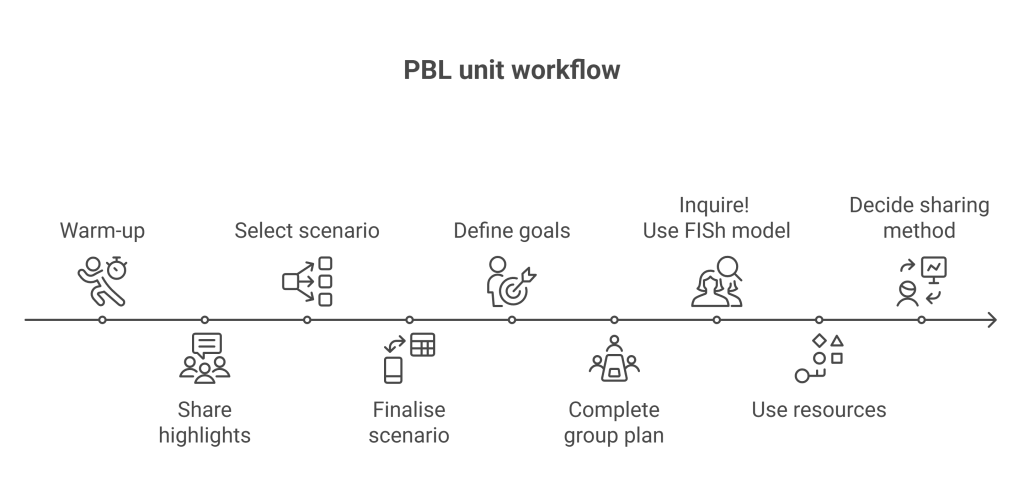16 Unit 4 Datafication and generative artificial intelligence in Education
Introduction to the unit
The increasing presence of data and artificial intelligence in education is reshaping how we teach, assess, learn, and understand educational processes. This unit critically examines the datafication of education—how data is collected, interpreted, and used to influence decision-making and learner experiences. We explore the concept of a datafied society and the implications it holds for equity, agency, and ethics in education. A key focus is on developing critical data literacy, enabling educators and learners to engage thoughtfully with data-driven systems. The unit also investigates the transformative potential and challenges of generative AI in educational contexts, encouraging critical reflection on its role in shaping the future of learning.

PBL unit workflow overview

Individual warm-up activities
Activity 1: Read Erstad et al. (2024) (School context) or Atenas et al. (2020) (HE context) about critical literacies and data and create a list with the key learning points. Create a visualisation with what stood out for you. This can be done manually or use a digital tool. Also consider Napkin.ai and create your visualisation from the list you have put together. Edit your visualisation so that it mirrors your thinking.
Activity 2: After reading Bozkurt et al. (2024) go back and check out Figure 1 and Figure 2. in this paper. Select 3 dimensions of each and explain how these relate to you as an educator and student in one sentence each. Then take these sentences to Microsoft Copilot and ask it to create an image based on each sentence. Keep the images that connect to your sentence. You may need to modify your sentence and provide further instructions. Alternatively read Hillman and Couldry (2025) and select 3 key points the authors are making and engage in a similar way how these relate to and your students. Follow the same instructions.
Activity 3: When you have completed Activity 1 and 2 think about the future and alternative possibilities for the use of data and GenAI in your professional context. Ask yourself 3 “What if” questions and attempt to answer these critically and creatively. Share these with at least one of your peers and engage in a conversation about these with them and their “What if” questions. To complement this inquiry you may wish to access Microsoft Copilot and invite GenAI to ask you three critical questions based on one of your “What if” questions and the response you gave. . You could even invite Copilot to role play with you. Ask Copilot to be a headteacher, manager of Dean or any other role that relates to your professional context. Avoid adding personal details into Copilot. What did this exchange enable? How does your engagement with GenAI differ from the conversation you had with your peer(s)? Any biases and hallucinations you observed? Remember, you have oversight! Revisit this activity after the group task for this unit.
Sharing
When you have completed the warm-up activities share these with your group and discuss. What do you notice? Capture three learning points.
Scenario
Choose a scenario from Part 2 that links with this unit or generate your own based on tailored parameters that closer align to your professional context as a group. You can do this manually or use GenAI. You will find instructions there.
You will need to save the scenario your group decides to use (e.g. the collaborative space in Teams). Add it to your collaborative learning space so that you can all easily access it.
Once this is done, continue with the tasks that follow.
What would you like to achieve as a group?
This will be really important to agree as a group as it will be driving what you will be working on as a group and put a plan together on how you can be successful in achieving what you set out to do. Consider using a coaching model such as GROW (Whitmore, 1996).
Group unit learning outcomes
After reading the scenario carefully and discussing in the group on which aspect of the scenario you will be focusing on, define your learning outcome(s)
LO1
LO2
Using Step 1: Focus, from the FISh model will help you with this (See section Working with FISh).
Module learning outcomes
Explain how your learning outcome(s) relates to the module learning outcomes.
On successful completion of the module you will have demonstrated the following Learning Outcomes (LO) relevant to the subject:
LO1: Critically assess key contemporary debates of digital technology, education and society in your professional context.
LO2: Apply specific learning theories relevant to digital education in your professional context.
LO3: Critically reflect on a range of digital technologies and practices in your professional context.
Skills Learning Outcomes
On successful completion of the module students will have demonstrated the following skills learning outcomes:
SLO1: Critically reflect on the use of digital education in your own professional practice
SLO2: Expand your professional network of digital education practitioners and become an active and valued member of such communities both online and in person
SLO3: Collaborate effectively online using a range of digital communication tools with other digital education practitioners
SLO4: Use appropriate digital tools to present and communicate information
Group plan
Use this table to capture all information relating to your work linked to this unit. Using Step 2 and Step 3 of the FISh model will help you with this (see section working with FISh).
| What would you like to achieve as a group | |
| Timeline | |
| Who will do what and by when | |
| Digital tools needed/used | |
| Final output, format | |
| Assessment criteria for group evaluation
(Use the ones agreed for the module) |
|
| Group reflection and learning | |
| What resources can we use | |
| What other resources do we need | |
| How can the tutor support us |
Literature
Atenas J., Havemann L. and Timmermann C. 2020. Critical literacies for a datafied society: academic development and curriculum design in higher education. Research in Learning Technology, 28. https://doi.org/10.25304/rlt.v28.2468
Bozkurt, A. Xiao, J., Farrow, R., Bai, J. Y. H., Nerantzi, C., Moore, S., Dron, J., Stracke, C. M. et al. 2024. The manifesto for teaching and learning in a time of generative AI: A critical collective stance to better navigate the future. Open Praxis. 16(4), 487–513. https://doi.org/10.55982/openpraxis.16.4.777
Bradbury, A. 2020. The five P’s of datafication. Talk given at Seeing Data. 9 July 2020. https://discovery.ucl.ac.uk/id/eprint/10115686/1/Bradbury%20The%20Five%20Ps%20of%20Datafication.pdf
Erstad, O. Gilje, Ø., Gudmundsdottr, G. B., Wagstaffe, R. B., Kumpulainen, K., Viberg, O., Williamson, B., Tondeur, J., and Howard, S. 2024. The datafication of education. Agile EDU. http://agile-edu.eun.org/documents/9709807/9862864/Updated+D2.1+Datafication+in+and+of+Education_090623.pdf/3a549d79-6d8e-4dc7-b556-f8745414ee39
Hillman, V. and Couldry, N. 2025. Infantilising education through risk-averse educational technologies of calculability: a critical essay. British Journal of Sociology of Education, 1–18. https://doi.org/10.1080/01425692.2025.2519485
Luo, J. 2024. How does GenAI affect trust in teacher-student relationships? Insights from students’ assessment experiences. Teaching in Higher Education, 1–16. https://doi.org/10.1080/13562517.2024.2341005
Miao, F. and Cukurova, M. 2024. AI Competency framework for teachers. UNESCO. https://unesdoc.unesco.org/ark:/48223/pf0000391104
Ratner, H., Andersen, B. L. and Madsen, S. R. 2018. Configuring the teacher as data user: public-private sector mediations of national test data. Learning, Media and Technology, 44(1), 22–35. https://doi.org/10.1080/17439884.2018.1556218
Sander, I. 2023. Critical datafication literacy – a framework for educating about datafication. Information and Learning Sciences. 125(3/4), 270-292. http://dx.doi.org/10.1108/ILS-06-2023-0064
Sander, I. 2023. Critical datafication literacy – a framework for educating about datafication”, Information and Learning Sciences, forthcoming. https://www.hsu-hh.de/sozgov/wp-content/uploads/sites/841/2023/12/Critical-Datafication-Literacy-Framework-Paper-Preprint-AAM.pdf
Sparrow, R. and Flenady, G. 2025. Bullshit universities: the future of automated education. AI and Society. https://doi.org/10.1007/s00146-025-02340-8
Williamson, B., Bayne, S. and Shay, S. 2020. The datafication of teaching in Higher Education: critical issues and perspectives. Teaching in Higher Education, 25(4), 351–365. https://doi.org/10.1080/13562517.2020.1748811
Williamson, B., Macgilchrist, F. and Potter, J. 2023. Re-examining AI, automation and datafication in education. Learning, Media and Technology, 48(1), 1–5. https://doi.org/10.1080/17439884.2023.2167830
Wieczorek, M. 2025. Why AI will not Democratize Education: a Critical Pragmatist Perspective. Philosophy and Technology 38. 53. https://doi.org/10.1007/s13347-025-00883-8
Woolf, B. P. 1991. AI in Education. COINS Technical Report 91-37. April 1991. To appear as an article in the Encyclopedia of Artificial Intelligence, Second Edition, edited by Stuart C. Shapiro, John Wiley & Sons, Inc.: New York, NY. https://web.cs.umass.edu/publication/docs/1991/UM-CS-1991-037.pdf
Multimedia resources Food for thought series created with our students
External multimedia resources
Food for though videos x 2 here
UNICEF | Data Manifesto: You can take action on children’s data
https://www.youtube.com/watch?v=PnOcoR1zfXU
UNICEF Global Forum on AI for Children

